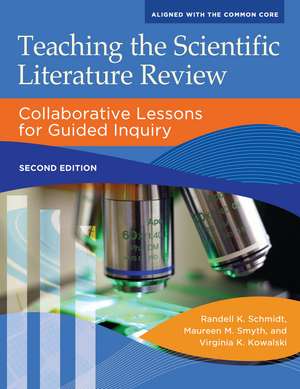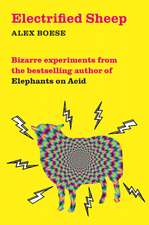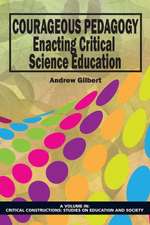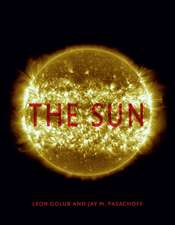Teaching the Scientific Literature Review: Collaborative Lessons for Guided Inquiry: Libraries Unlimited Guided Inquiry
Autor Randell K. Schmidt, Maureen M. Smyth, Virginia K. Kowalskien Limba Engleză Paperback – 20 apr 2014 – vârsta până la 17 ani
Preț: 267.81 lei
Preț vechi: 378.35 lei
-29% Nou
Puncte Express: 402
Preț estimativ în valută:
51.25€ • 53.31$ • 42.31£
51.25€ • 53.31$ • 42.31£
Carte tipărită la comandă
Livrare economică 12-26 aprilie
Preluare comenzi: 021 569.72.76
Specificații
ISBN-13: 9781610697392
ISBN-10: 1610697391
Pagini: 192
Dimensiuni: 216 x 279 x 18 mm
Greutate: 0.54 kg
Ediția:Revised
Editura: Bloomsbury Publishing
Colecția Libraries Unlimited
Seria Libraries Unlimited Guided Inquiry
Locul publicării:New York, United States
ISBN-10: 1610697391
Pagini: 192
Dimensiuni: 216 x 279 x 18 mm
Greutate: 0.54 kg
Ediția:Revised
Editura: Bloomsbury Publishing
Colecția Libraries Unlimited
Seria Libraries Unlimited Guided Inquiry
Locul publicării:New York, United States
Caracteristici
Encourages inquiry into science-based subjects by directing students towards a topic of personal interest linked to those studied in their science class
Notă biografică
Randell K. Schmidt is head librarian of Gill St. Bernard's School in Gladstone, NJ.Maureen M. Smyth is school library media specialist at South Hunterdon Regional High School in Lambertville, NJ.Virginia K. Kowalski, MLS, was formerly teaching librarian in both the Middle School and Upper School at Gill St. Bernard's School, Gladstone, NJ.
Cuprins
ForewordCarol Kuhlthau, Professor Emerita, Rutgers UniversityPrefaceAcknowledgmentsPart I Teacher's PracticumChapter 1 The Value of Inquiry-Based Research ProjectsChapter 2 The Inarticulated Question: In the Context of the Debate between Content and ProcessChapter 3 Collaboration for MeaningChapter 4 Serving the Individual Student: Addressing Learning Styles and DifferencesChapter 5 Research Project AssessmentChapter 6 Replication and Flexibility SquaredPart II Student WorkshopsResearch in the Initiation Stage of the Information Search ProcessWorkshop 1 The Benefits of a Scientific Literature ReviewOverviewWorkshopStudent HandoutWorkshop 2 The Student's Assignment BeginsOverviewWorkshopStudent HandoutsWorkshop 3 Making It Meaningful: Browsing Databases/Finding InformationOverviewWorkshopStudent HandoutsWorkshop 4 Creating and Organizing the Research FolderOverviewWorkshopResearch in the Selection Stage of the Information Search ProcessWorkshop 5 Researching the IntroductionOverviewWorkshopStudent HandoutWorkshop 6 Starting the Reference ListOverviewWorkshopStudent HandoutsAssessment RubricWorkshop 7 How to Read and Take Notes from a General Press ArticleOverviewWorkshopStudent HandoutWorkshop 8 How to Write the IntroductionOverviewWorkshopStudent HandoutAssessment RubricResearch in the Exploration Stage of the Information Search ProcessWorkshop 9 Searching for Peer-Reviewed StudiesOverviewWorkshopStudent HandoutWorkshop 10 How to Read and Take Notes from a Peer-Reviewed Journal Study or White PaperOverviewWorkshopStudent HandoutsResearch in the Formulation Stage of the Information Search ProcessWorkshop 11 How to Write the MethodologyOverviewWorkshopStudent HandoutAssessment RubricResearch in the Collection Stage of the Information Search ProcessWorkshop 12 How to Write the Results of ResearchOverviewWorkshopStudent HandoutAssessment RubricWorkshop 13 How to Use and Create a Table, Chart, or Graph for the ResearchOverviewWorkshopStudent HandoutsWorkshop 14 How to Write the Analysis of ResearchOverviewWorkshopStudent HandoutAssessment RubricResearch in the Presentation Stage of the Information Search ProcessWorkshop 15 How to Write the ConclusionOverviewWorkshopStudent HandoutAssessment RubricWorkshop 16 How to Write the AbstractOverviewWorkshopStudent HandoutsAssessment RubricWorkshop 17 Creating a Title and Completing the Cover PageOverviewWorkshopStudent HandoutResearch in the Assessment Stage of the Information Search ProcessWorkshop 18 Putting It All Together to Hand Over the Scientific Literature Review to the TeacherOverviewWorkshopStudent HandoutsReferencesIndex
Recenzii
[A]n invaluable resource for any school librarian, science teacher, special education teacher, or those in educational leadership interested in preparing Grade 11-12 students for the research demands and literature review work expected in college. . . . Teaching the Scientific Literature Review: Collaborative Lessons for Guided Inquiry truly teaches. In its pages you will find high-quality content, robust instruction, and all the tools needed to facilitate dynamic student learning.

















